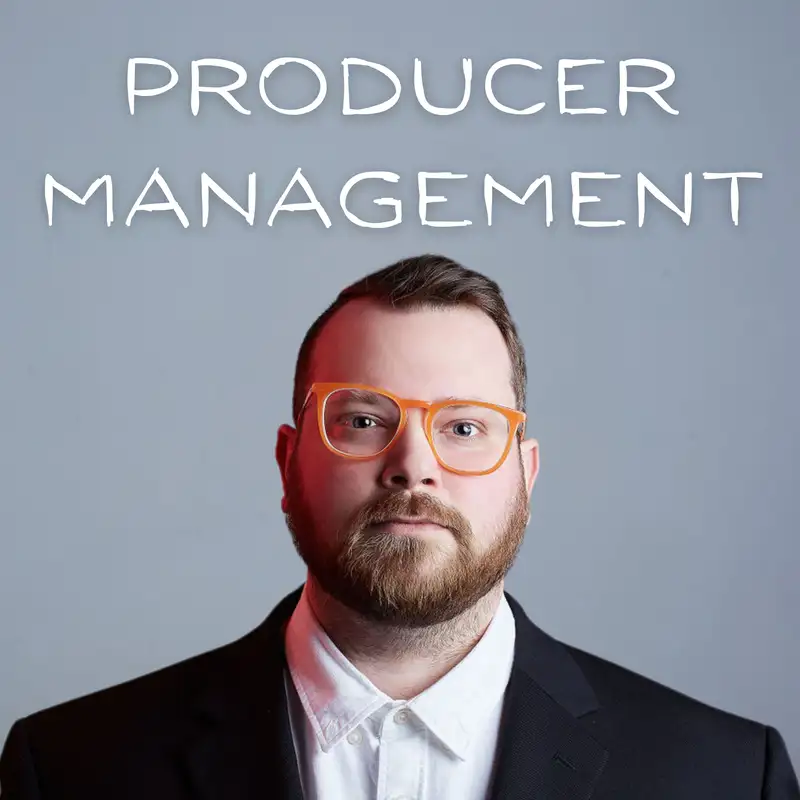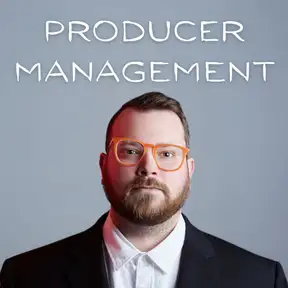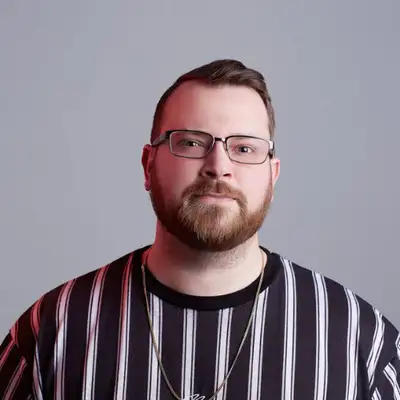
An Underrated Tactic Producers Use To Attract Clients
My music production company actually used to do this like 10 years ago and it still works today. We would create content for Splice on their blog. This is kind of the early days of Splice.
You go out and find a company that has the same market as you but does not have a competing offer. Hey everyone, Daniel Grimmett here. You're listening to Producer Management, the podcast that lets you in on real conversations between professional music producers and their teams, the deals, the strategies, and the unfiltered advice.
This show is brought to you by my company, Dark Label Music. When producers want clarity, strategy, and growth, they call us. We're hired as a strategic partner, part management, part creative and business development, designed for the realities of being a music producer right now.
So whether you're a small studio or a Grammy-winning veteran, reach out to us at darklabelmusic.com to see if we can help. All right. Hey everybody, I hope that you're having a great summer so far.
I've got an interesting episode for you today. I'm going to tell you about a business tactic that very few music producers actually do, but I think that more of them should try it. It does take a little bit of legwork, but it has a massive upside and can lead to more clients.
It can grow your personal brand and even expand your network. And it typically doesn't cost any money to do this upfront. I'm going to tell you what it is, show you an example, and then go through every step you need to follow in order to implement this tactic.
My music production company actually used to do this like 10 years ago and it still works today. Quick note for the OG listeners. This is a repost from our old podcast, Music Pro Daily, but it's been over a year since we first shared this episode.
So most of you have probably forgotten about it. And it will be the first time hearing it, of course, for those of you who are new to the podcast. Here's the episode.
Okay. So last week I was working on an idea for an upcoming YouTube video that we're making for the Dark Label channel. It's about why I quit my six-figure music production business, but I was stuck because I could not figure out what I wanted to make for the thumbnail image.
And I can't record the video until the title and the thumbnail image is done, which meant that now I was behind schedule. So I decided to jump on YouTube and start looking around for some thumbnail inspiration. And I came across a channel called How to Write Songs.
Do you guys know this channel? They make like educational videos for songwriters. And there was a video on this channel, I think it's the most recent one, with the title that said, Scam or legit? We tested an online recording studio with our new song. And that piqued my interest, of course, because a lot of my producers, although they don't necessarily call themselves an online recording studio, they do a lot of remote work.
So this affects the lane of business that they are in. So I wanted to watch and I'm praying to myself, man, I hope they had a good experience in this video because I'd hate for 100,000 songwriters. It's a big channel.
I'd hate for 100,000 songwriters to think that remote work is not a good option for them. Spoiler alert, they did have a good experience, a great experience, because the entire video was actually a collaboration between this channel, How to Write Songs, and a producer named Joe Wadsworth, who has a remote production company called The Online Recording Studio. And I haven't worked with Joe.
I don't personally know Joe, but I've heard of his website before because I ran a somewhat similar business back in the day. So I did what any good YouTuber does when they see someone else's video. I scrolled right down to the comments to see what people thought about it.
And then I jumped up to the description to see how they were monetizing this. And then I watched the video. But the comments, man, the comments were just filled with people that either already worked with this guy's company and love what they do, or people that haven't worked with them yet, but were just making comments about how valuable the process looked and that it seemed like a really good deal financially.
You know, they got their song made for, I forgot, $800,000 or something. Really good demo fleshed out. And people are like, oh yeah, that makes sense.
That's good. So I was like, okay, cool. Positive response here.
And then in the description under the video, I went up there and looked, and there was a trackable link where you could book a call with that producer and get a 10% discount on your first song. Now the discount I could take or leave, that's not the genius move here. The genius move is obviously the collaboration itself.
You go out and find a company, entity or influencer that has the same market as you, but does not have a competing offer. So in this example, both the online recording studio guy and the How to Write Songs YouTube channel have the same market, songwriters, probably like up and coming songwriters, people getting started with songwriting. But one of them sells production and the other one sells education.
So for example, back in the day at my production company, when I ran that, we used to do joint ventures with like Splice. We would create content for Splice on their blog. This is kind of the early days of Splice.
And at the time there were a lot of DJs on the platform, either using their collaboration tool, which they were kind of more known for that before the sample stuff. But obviously the samples were there too. So DJs would be there getting samples or using the collaboration tool.
And we did a lot of like top lining songwriting, you know, projects for DJs back then. This was 2015 ish probably. So it made sense, right? Similar audience, different offers.
Maybe for you it's Lander or American Songwriter Magazine or another YouTube channel. So I would start by making a huge list of various companies and channels that reach the same market that you wanna work with. Start popping them onto a spreadsheet with a link so you can easily find them and a quick description of what it is, just so you don't forget when you go back through your list later.
Sometimes you make this big list, you go back to the top and you're just like, I completely forgot what this thing was. So make a little description and a link. Step two is to find the contact info for all of them.
So go back down through the list. You could do it at the same time if you want, but go back through your list and find the contact info for all of them. YouTubers will generally have an email listed publicly for like brand deals and stuff, or they could be reached via Instagram.
For bigger companies, Instagram can still be an option, but I may also try like X or LinkedIn. Whenever I've done collaborations with companies specifically, it's usually someone in their marketing or content department that I'm working with. And they're usually pretty receptive because their job is just to keep like the content flowing.
So they're always looking for ideas and things to do. Step three is to put together an idea for the collaboration and make sure to have an understanding of how it benefits them, not just you. And the idea here is important.
For example, if you read our last issue, number 21 of the producer files, our newsletter, then I briefly touched on this. We had a producer who had an Instagram reel go viral and he used a popular AI tool to make the content. I got in contact with that AI vocal tool.
And in our discussions, I mentioned that this story could be a use case for them to tap into a more pro user market by demonstrating how their software can be used by producers to make content that attracts paying clients. So brand new use case that they can introduce to the market. Step four is to start reaching out to people on your spreadsheet.
And I would do this in small batches because you may get into some long conversations. Just a few at a time should work. I would rather do a few really impactful collaborations throughout the year than 10 all at once up front and then not really have much after.
Follow up is going to be key here. Don't annoy people every week, but just so you know, companies and busy YouTubers have a lot going on. Even if you've already gotten a conversation going, you will most likely have to keep things moving on your side.
Step five is discussing the terms and implementation. Sometimes they want a piece of the action financially. Like for example, I would assume, I don't know for sure, but I would assume that the video with how to write a song, they have a trackable link.
I assume they get a little piece if one of their viewers books a song through Joe's company. I don't know for sure, but sometimes they will want a piece. Other times they don't really care about that.
They just want cool content for their audience or to give them some kind of deal or something cool. It's just for goodwill. I've had it go both ways.
Just ask them what would benefit them the most, then create an implementation plan. Ask them when they would want to roll this out and then you make a timeline with action steps and send it to them. Don't wait for them to do it.
They can adjust your plan if they need to, but you go ahead and show them, hey, I'm ready to go. Let's do it. The last point I'll make is this.
The most ideal way to approach collaborations is through people you know. So if you know someone who has an audience online or works for a company or knows someone that knows someone and can make you an intro, then that will typically cut the effort in half. Not required, but it definitely makes it easier.
And again, I want to stress that this has to be beneficial to them and their audience, those they serve, their customers, whoever. If they get the vibe that you're just doing a promo campaign for yourself, then they're probably not going to respond. Really take some time to flesh out a remarkable idea that is clearly beneficial to their audience and make it a win-win.
If you go to producermanagement.com, you'll find links to jump on our newsletter, which I highly recommend because it's the perfect companion to the show. And if you enjoy what we're doing here, please leave us a five-star review or share it with a friend. Thanks for listening.
That's the episode.


